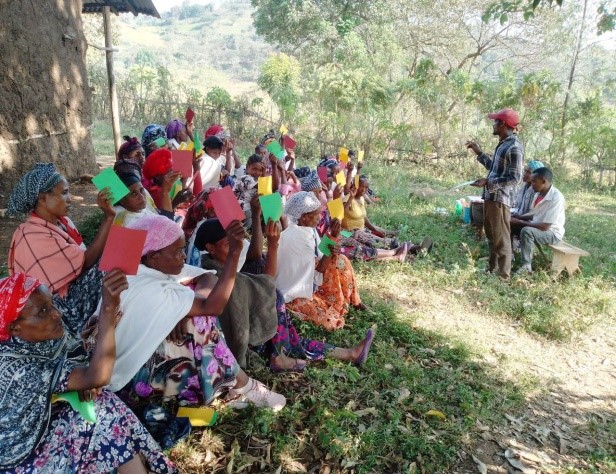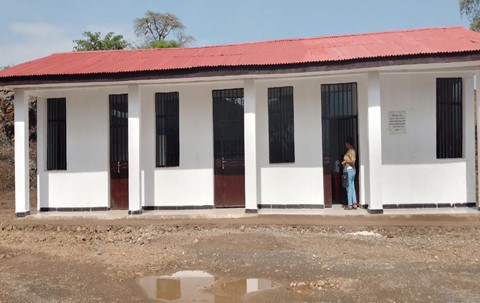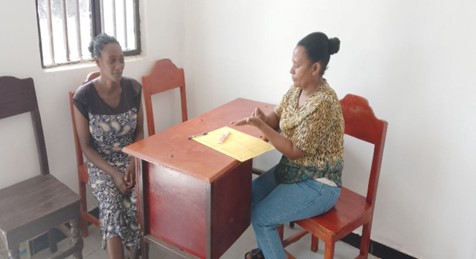Success Story
Private sector engagement in primary health care through the Community Score Card
February 12, 2024
Sheba Yoyo kebele (village) is located in Southwest Ethiopia region, where the USAID-funded New Partnership Initiative (NPI) EXPAND Ethiopia activity is working to support the local community to exercise social accountability (SA) activities to hold the primary health care system and local government accountable to address health care challenges through the implementation of the Community Score Card (CSC).
The kebele is 40 km from the Dawro zone capital Tercha town, and, like any other remote, rural area in the country, its community has been experiencing enormous development problems. These include a lack of accessibility to quality primary health care services, creating a considerable burden on both health and development. The local community has been hoping to solve their challenge of lack of access to the closest health center. With no health center in the Sheba Yoyo kebele, community members had to walk hours to the adjacent kebele’s health post to receive services. However, no solutions were found until the implementation of CSC, implemented by a local partner Ilu Women and Children Integrated Development Association (IWCIDA).
Since October 2022, the Sheba Yoyo community has been engaging with IWCIDA in collaboration with local government on this social accountability work. The project leverages the Ethiopia Ministry of Health-endorsed CSC approach to link local communities with the primary health care system to improve the quality of family planning (FP) and maternal, newborn and child health (MNCH) services. Through this scorecard process, the Sheba Yoyo community scores the quality of health services provided by their local Primary Health Care Units (PHCUs) quarterly. From there, independent groups called client councils work with health facilities and the community to analyze the scores and share them with the health centers. PHCUs and communities then collaborate to develop Joint Action Plans to address community concerns impacting access to quality health services and assign responsible bodies to address those challenges.

Community scorecard scoring session in Southwest Ethiopia region.
In the case of Sheba Yoyo, community representatives, client councils, and community members were mobilized from every corner of the kebele by health extension workers and client councils to jointly plan mitigation actions along with Health Development Armies, the Kebele Administration Manager, the chairperson from each sub-kebele, and the health center. During these sessions, Sheba Yoyo community members prioritized the lack of access of the health post as one of their key health problems during the conference, noting that it was far from the community and thus inaccessible.
The long distance of the health post from this kebele posed challenges to the community, meaning they had to travel on average 20 kilometers to get basic preventive and promotive medical services. After the scoring session, PHCU administrators agreed to mobilize resources from the community and contribute to the construction of a new health post in the Sheba Yoyo kebele closer to the community.
One private company, ET Mining PLC, soon came on board to help address this urgent problem. ET Mining PLC decided to fully support the construction of the new health post and obtained permission from the woreda (district) government to construct it. To coordinate the construction, a focal person was assigned from the nearby health center who mobilized the health center staff and the community to identity resources to construct the new health post. ET Mining PLC’s contribution of the new health post was worth approximately two million Ethiopia Birr, over US$35,000.

Newly constructed Sheba Yoyo health post, Southwest region, Ethiopia.
After the health post construction, the woreda government supplied the necessary medical equipment and medicines, and trained health professionals on the newly constructed health post. The new health post enabled the Sheba Yoyo kebele community access to improved basic prevention and promotive health services, including maternal and child health, prevention and control of communicable diseases, curative services, and infection prevention. The health extension workers assigned to the health post are being supported by community groups and supported by the nearby health center staff.
One health extension worker assigned in Sheba Yoyo kebele, Mrs. Bogalech W/Michael, explained that she is thrilled to serve in an improved infrastructure which allows her to provide better care to her patients. She noted, “It’s a positive change that enhances our ability to serve the community effectively. Through the experience gained from CSC implementation now people understand their privileges and can remind government of their responsibilities.” Before the construction, health workers were unable to reach the community with basic healthcare services. Now, they are able to carry out their daily work in a comfortable environment and reach more community members.
Mrs. Aster Abayneh, who resided in the catchment area of Sheba Yoyo health post, said “access to the health facility creates opportunities for community participation in development activities, and helps to reduce the burden of many medical service seekers who used to travel more than 30 km to reach health center.” She added “the newly constructed health post is a beacon of hope for women and children in our community. It provides a safe space for women to seek support and advice on maternal and child health, as well as access to essential healthcare services. It empowers us to take charge of our well-being and ensures a brighter future for our children.”

A mother receiving health services from the Sheba Yoyo health post.
The director of the Wara health center, a nearby center supporting the newly constructed health post, noted that since the establishment of Sheba Yoyo kebele’s new health center, there has been a notable improvement in FP/MNCH metrics registered in the Health Management Information System reports during the six-month project implementation period from January to June 2023. For example, the percentage of births at the health facility attended by skilled health personnel, such as trained doctors, nurses, or midwives, improved from 31% to 47% in the kebele. The percentage of women who attended at least four antenatal care visits during their pregnancy also improved there, from 32% to 68%. Additionally, the percentage of women receiving postnatal care at the health post at least once within seven days of delivery improved from 59% to 82%. Finally, the percentage of children in the kebele who received all vaccine doses and thus achieving full immunization by their first birthday improved from 86% to 89%. Beyond the increase in access to health care services, the new health post also contributes to health system quality improvements and broader social development initiatives to sustainably improve health outcomes in Sheba Yoyo kebele and in the rest catchment areas of Wara Health center.
NPI EXPAND and IWCIDA introduced the Community Score Card activity to contribute to improved availability and utilization of high-quality, integrated FP/MNCH services, with a focus on reaching underserved populations. These social accountability activities empower communities to act and have ownership over their health, driving a cycle of responsive and accountable service delivery.